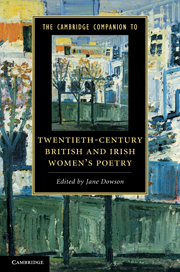Book contents
- Frontmatter
- 1 Introduction
- 2 Post/Modernist rhythms and voices: Edith Sitwell and Stevie Smith to Jo Shapcott and Selima Hill
- 3 Reframing women’s war poetry
- 4 Verbal and visual art in twentieth-century British women’s poetry
- 5 Towards a new confessionalism
- 6 The mid-Atlantic imagination: Mina Loy, Ruth Fainlight, Anne Stevenson, Anne Rouse and Eva Salzman
- 7 The Irish history wars and Irish women’s poetry: Eiléan Ní Chuilleanáin and Eavan Boland
- 8 Interculturalism: Imtiaz Dharker, Patience Agbabi, Jackie Kay and contemporary Irish poets
- 9 Post-pastoral perspectives on landscape and culture
- 10 Feminism’s experimental ‘work at the language-face’
- 11 Carol Ann Duffy, Medbh McGuckian and ruptures in the lines of communication
- Selected reading
- Index
7 - The Irish history wars and Irish women’s poetry: Eiléan Ní Chuilleanáin and Eavan Boland
Published online by Cambridge University Press: 28 May 2011
- Frontmatter
- 1 Introduction
- 2 Post/Modernist rhythms and voices: Edith Sitwell and Stevie Smith to Jo Shapcott and Selima Hill
- 3 Reframing women’s war poetry
- 4 Verbal and visual art in twentieth-century British women’s poetry
- 5 Towards a new confessionalism
- 6 The mid-Atlantic imagination: Mina Loy, Ruth Fainlight, Anne Stevenson, Anne Rouse and Eva Salzman
- 7 The Irish history wars and Irish women’s poetry: Eiléan Ní Chuilleanáin and Eavan Boland
- 8 Interculturalism: Imtiaz Dharker, Patience Agbabi, Jackie Kay and contemporary Irish poets
- 9 Post-pastoral perspectives on landscape and culture
- 10 Feminism’s experimental ‘work at the language-face’
- 11 Carol Ann Duffy, Medbh McGuckian and ruptures in the lines of communication
- Selected reading
- Index
Summary
Introduction: the Irish history wars and women’s voices
This chapter explores the idea of history as addressed in Irish women’s poetry, illustrated by examples from the work of the current two most senior practitioners in the field, Eile´an Nı´ Chuilleana´ in (b. 1942) and Eavan Boland (b. 1944). Eiléan Ní Chuilleanáin – poet, scholar, essayist, editor and translator – published her first main collection in 1972 and her seventh in 2009. Born in Cork, she is an Associate Professor in the School of English at Trinity College Dublin who specialises in Renaissance literature, literature and folklore, and literature and translation. Eavan Boland – poet, critic, teacher, essayist and editor – has published ten main collections of poetry since her first book in 1967. Born in Dublin, she is Professor in the Humanities and Director of the Creative Writing Programme at Stanford University.
Ní Chuilleanáin and Boland, in the famous words of the latter, ‘began writing in a country where the word woman and the word poet were almost magnetically opposed’. As foundational presences in the by now well populated and recognised field of Irish women’s poetry, their work continues to enable and challenge their peers, among whom are the poets Medbh McGuckian, Nuala Ní Dhomhnaill, Paula Meehan, Rita Ann Higgins, Moya Cannon, Mary O’Malley, Kerry Hardie, Vona Groarke, Sinéad Morrissey, Caitríona O’Reilly, Colette Bryce and Leontia Flynn.
- Type
- Chapter
- Information
- Publisher: Cambridge University PressPrint publication year: 2011
- 2
- Cited by



